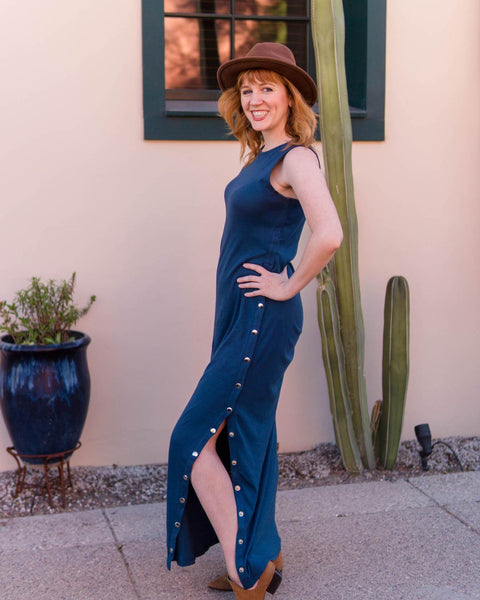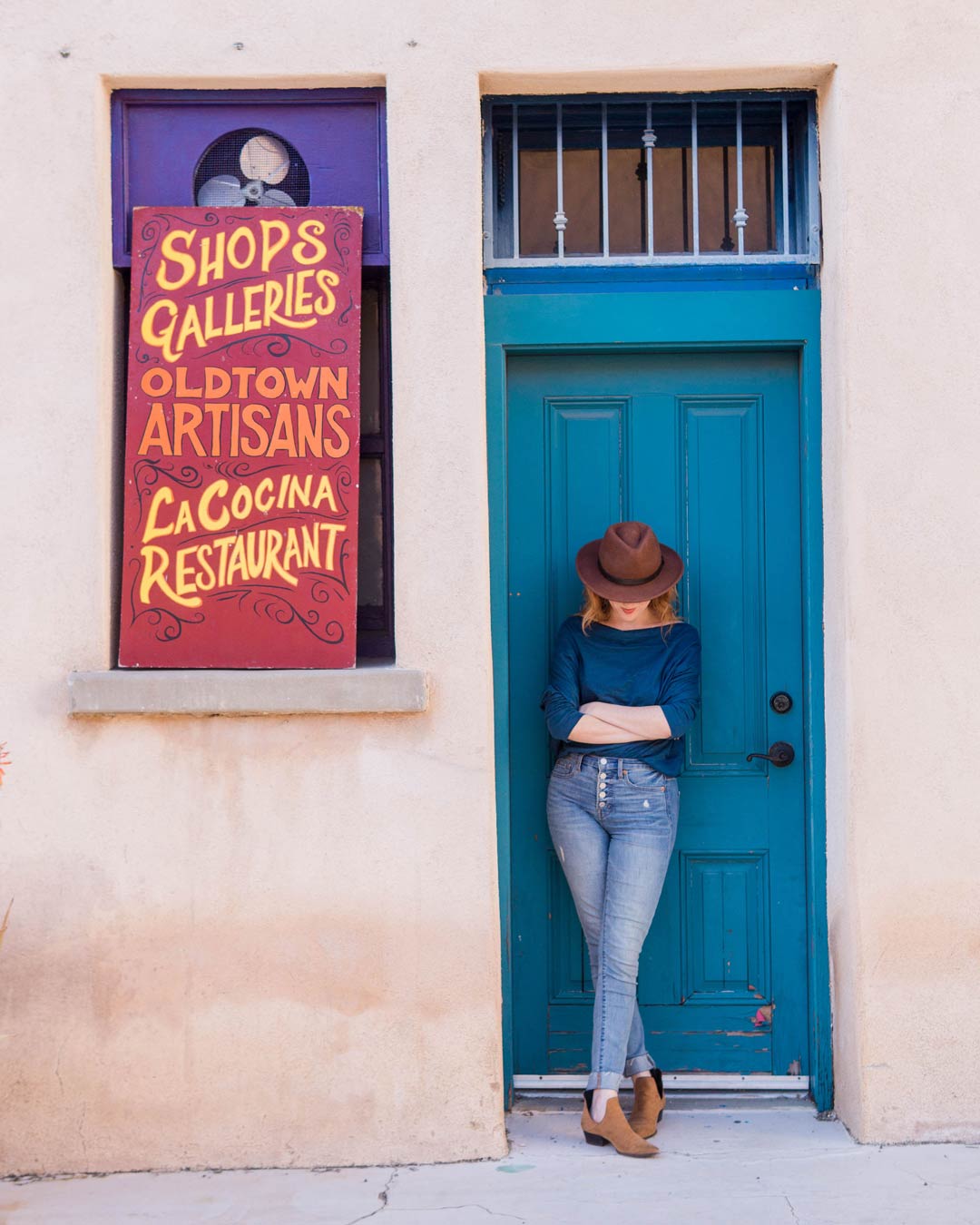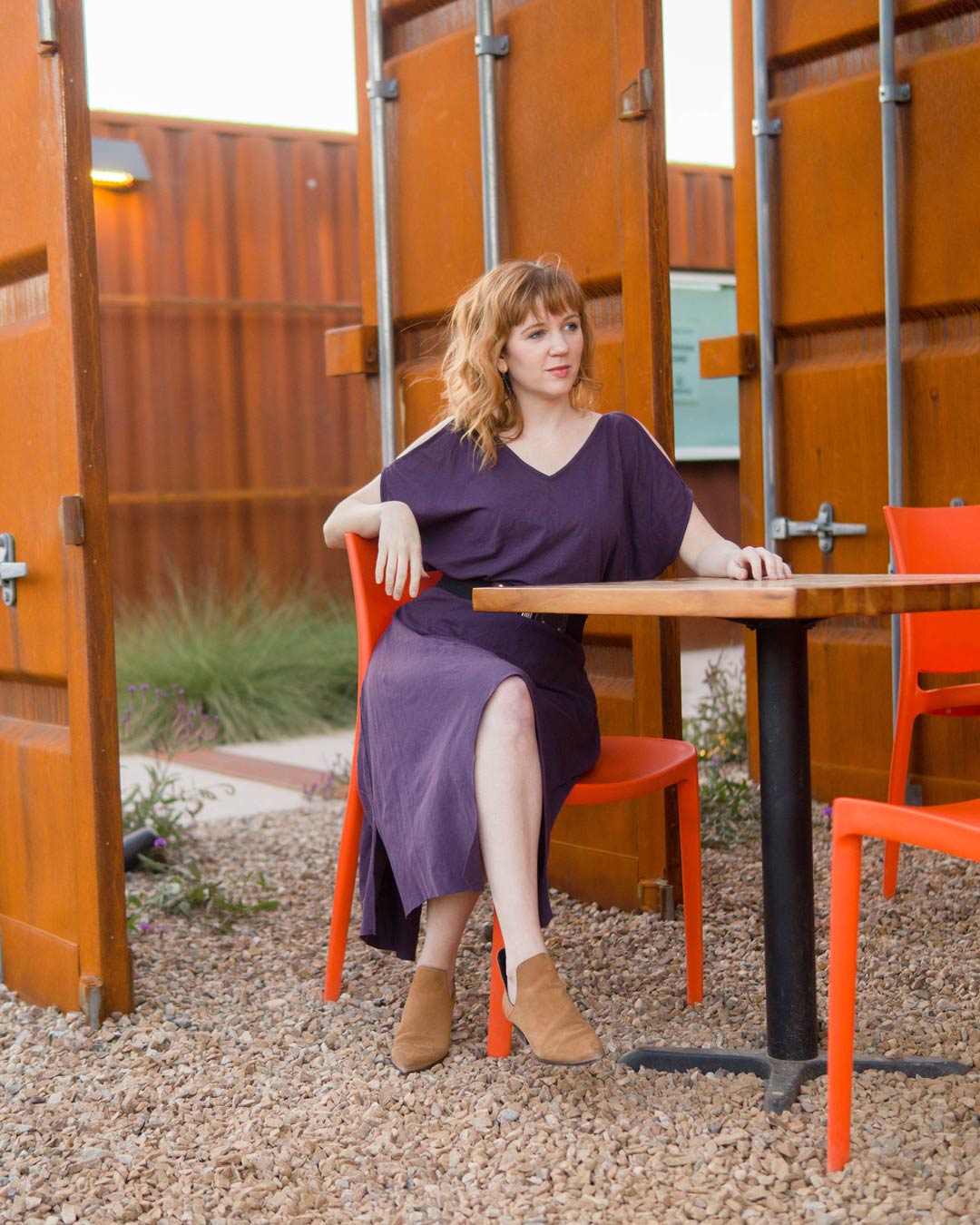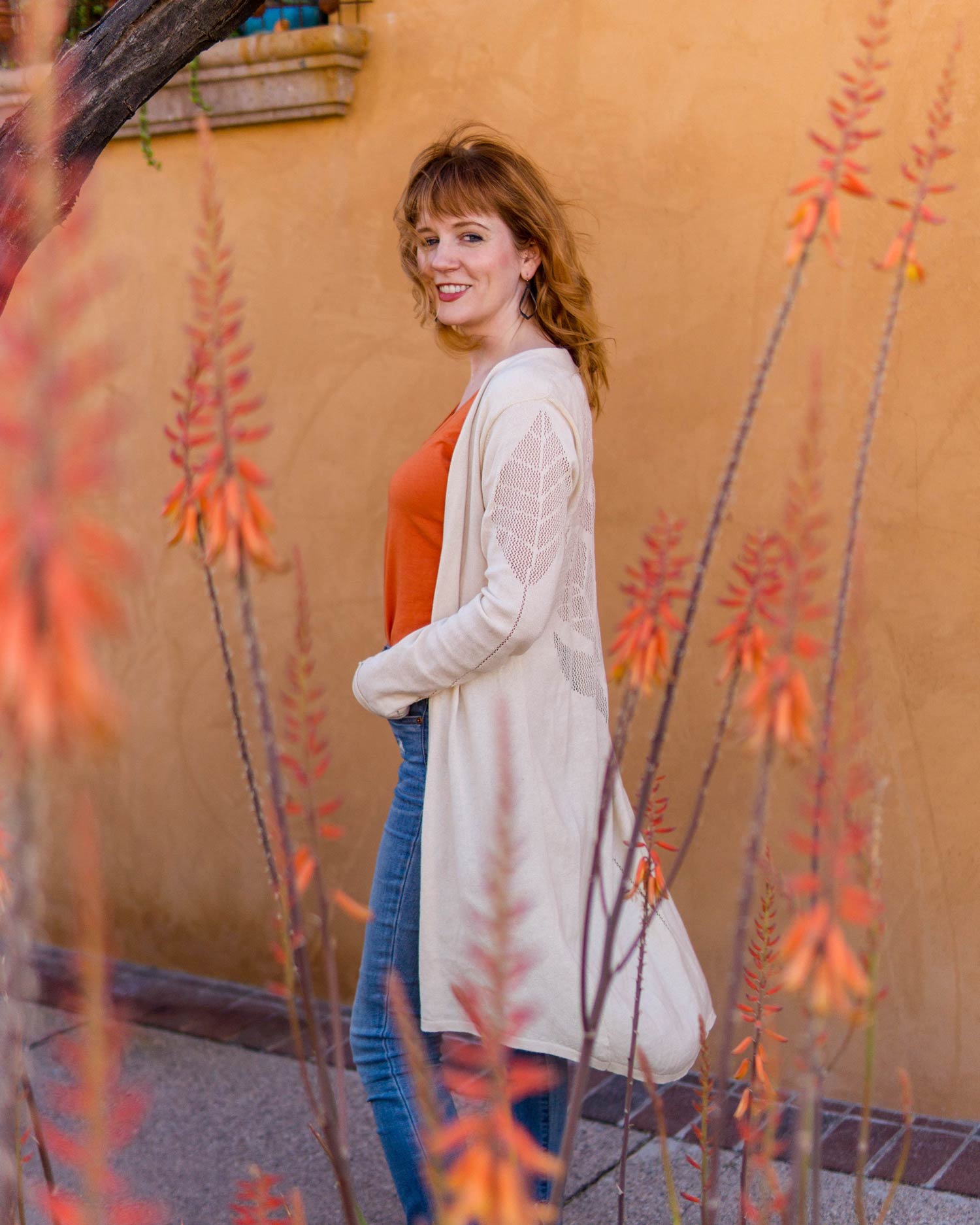Supporting artisanship and local communities is at the heart of our fair trade clothing brand! As travel season launches full swing, we wanted to get the low-down from one of our favorite ethical travel writers, Misty Foster of Green Suitcase Travel, on how to make sure your tourist dollars are having the best possible impact, supporting artisans and local economies.
Misty and her photographer, Brielle Farmer, went to the MSA Annex and the Old Town Artisans to photograph organic styles from our new Spring & Summer '19 line. Both are great places for supporting local artisans in Tucson, Arizona!
Snap Maxi Dress + Ink Blot Cardigan
Green Suitcase Travel's Tips on Supporting Local Artisans
Who doesn’t love the thrill of finding a one-of-a-kind gift or souvenir during their travels? It’s a tangible and meaningful way to bring home a piece of the destination. If you want to bring back something truly authentic and unique, buy handicrafts and goods from local artisans!
Being a responsible traveler isn’t limited to the modes of transportation you take, or how you interact with the wildlife. While it’s important to be mindful your environmental footprint when traveling, one of the most direct ways you can have a positive impact is by supporting the local economy and community. After all, your tourism dollar should be going into the hands of the people at your destination so they can benefit from your tourism.
But how do you know if you are actually supporting local artisans when traveling?

Check the label
The first rule of thumb, don’t buy something that says Made in China when you are in France. If you want to buy local goods from the destination you are visiting, chances are if it’s made elsewhere, well, you get the idea.
Often this only applies to garments and certain textiles, but an obvious sign that you aren’t buying locally will be the location of the factory indicated on the purchase tag. Many stores have started to advertise that their goods are made locally and wear it like a badge of honor. You see this a lot in places like Italy, where authentic Italian leather and agricultural products are a big draw for tourists. Advertising something as “locally-made” has started to become synonymous with quality. Now, this doesn’t automatically mean that your handicrafts or goods will be ethically made or sourced. But it usually ensures that the origin of the item is at least coming from the place you are visiting.
Ask around
One of the most sure-fire ways to know if you are buying directly from or supporting local artisans is to ask. Ask a store clerk about the origin of an item, their relationship to the maker, and about the supply chain. Does the purchase of your item, directly support or empower the artist and their community? Is the item direct source or is the vendor a middle-man? How much of the profits are going into the hands of the person who made the item? It may feel uncomfortable to ask at first, but it’s worth the extra effort to know that your purchase is coming from.
Another alternative is to ask a few locals about unique locations to shop at. Ask them who their favorite artists and craftsman are and where to find them.
At large, open-air markets you can often find someone crafting their product in real time, which can be a real treat. At the Water Shed in Capetown, South Africa several artists sit in their booths making their art while visitors pass by. Being able to speak with the artist and get first-hand insight into their process can invoke an emotional attachment to the item. By associating the object with the person who made it and their personal story, it allows you to have a greater appreciation for where it came from.
Find a local guide who can take you to the right places
Not only is touring with a local guide a ton of fun, they usually know where the best-kept secrets are. Ask your guide to take you to shops, markets, and restaurants where the goods are made by the people running the establishment.
To find a guide, check sites like ToursByLocals or ask your hotel for a recommendation.
Cold Shoulder Top + Handkerchief Hem Skirt
Be wary of large markets or stalls selling the same products over and over again
Going to the Grand Bazaar in Istanbul or the Chaing Mai night market is a thrilling, multi-sensory experience. There are so many sights, sounds, and delicious smells to take in at the markets. Visiting these markets are highly recommended cultural experience. However, these markets can also be somewhat of a tourist trap. On the one hand, you’ll have the opportunity to explore foods and crafts native to the destination, which can be a great way to gain insight into the culture. On the other hand, much of what is sold at the markets has been mass-produced for tourist’s consumption and may not be as “authentic” as purported. The problem with some of these goods—though depending on your tastes it’s not necessarily a problem—is that many of the wares are explicitly manufactured to feed tourist demand for an idealized and stereotyped souvenir.
The problem with some of these goods—though depending on your tastes it’s not necessarily a problem—is that many of the wares are explicitly manufactured to feed tourist demand for an idealized and stereotyped souvenir.That means sombreros in Mexico, serapes in Peru, and sarongs in Thailand. Unfortunately, it also means you’re less likely to encounter avant-garde work that falls outside the narrow coral of stereotypes. That doesn’t mean that all of the stalls in the markets are peddling mass-produced souvenirs, there is certainly a fair share of vendors who do sale ethically-sourced goods.
Be careful how you bargain
It’s okay to haggle or bargain with certain vendors but know the cultural customs before doing so and be sure and show appreciation for their work. Leave your privilege behind and be sensitive to the sellers' queues. Most folks are usually game for negotiation but be mindful of the time and energy someone spent to make the item you desire. By showing genuine interest in the maker and their wares, you help to promote a positive cultural exchange.
Crochet Back Tank + Leaf Cardigan
Beware of shops that buy directly from artisans, then upsell the item
Go to the source, when possible. If you see a textile, statue, or painting that you like, ask who made it and if it’s easy to find them, do so! Many boutique stores curate and sell goods produced by artists from a community and then add a surcharge to the item. Of course, they have to do this in order to earn a profit for themselves. And many artisans choose to take a price cut on their handicrafts in favor of a wider distribution of their products. That said, some high-end boutiques capitalize on the product being “handmade by an artisan” as a way to charge way more than market value. Unfortunately, this also means that the artisan doesn’t always get a higher percentage of the profit, especially if they sold it to the vendor at wholesale prices.
While it’s great to be able to support multiple artisans in one place, it’s always better to buy directly from the maker, when possible. In Guatemala, there are many weaving and textile co-ops where you can not only buy a product directly from the artists, you can also learn how to weave or dye fabric.

Buy Fair Trade
That brings us to our last tip. Look for products that are fair trade certified. This means that the trade between the company and producer are paying fair prices to the producers. The fair trade certification ensures sustainable income and livelihoods for the producers by providing safe working conditions and employing community development funds. The rigorous certification process also takes a look at the environmental impact of the supply chain and prohibits the use of harmful and toxic chemicals.“Shopping Fair Trade means taking a stand for a system that treats everyone with respect.”- Fair Trade Global
Buying clothing or goods that are fair trade certified helps to keep a global standard for how developed nations can work with developing countries, in a transparent and meaningful way.
Whether you are shopping in Paris, France or in your own neighborhood, supporting local artisans tilts consumer demand in favor of a more balanced market. It shifts the focus away from fast fashion, mass consumerism, and unsafe working conditions towards a more ethical model of consumption.
Shop our Vacation Edit for dreamy styles perfect for your next adventure, in 100% organic cotton, and made in Peru with fair trade practices.

Brielle Farmer, Photographer
 Brielle is an LA native, currently living in Tucson, but always wishing she was in Paris. She loves photography and how it can capture the feeling of a moment so she can relive it over and over. Brielle believes in using the power of social media to make the world greener and a more peaceful place to live. You can follow her adventures on Instagram @briellecfarmer and see her photography work @brielleclarephoto.
Brielle is an LA native, currently living in Tucson, but always wishing she was in Paris. She loves photography and how it can capture the feeling of a moment so she can relive it over and over. Brielle believes in using the power of social media to make the world greener and a more peaceful place to live. You can follow her adventures on Instagram @briellecfarmer and see her photography work @brielleclarephoto.
Misty Foster, Writer
 Misty is a travel consultant, experience designer, and founder of Green Suitcase Travel. Misty has always had a knack for travel planning and a passion for the environment As a young child, she was cutting Barbie's hair, repurposing her clothes and driving her around in her hot pink R.V., looking to save the (stuffed) animals from extinction. Activist Barbie and Misty had many meaningful adventures saving the planet. Today her focus is helping travelers like you visit your favorite Destinations while leaving a lasting impact. Her passion is helping people find themselves in a place, an experience, or a set of ideas; inviting people to become more fully engaged with the world. Follow her adventures and travel advice on Instagram: @greensuitcasetravel.
Misty is a travel consultant, experience designer, and founder of Green Suitcase Travel. Misty has always had a knack for travel planning and a passion for the environment As a young child, she was cutting Barbie's hair, repurposing her clothes and driving her around in her hot pink R.V., looking to save the (stuffed) animals from extinction. Activist Barbie and Misty had many meaningful adventures saving the planet. Today her focus is helping travelers like you visit your favorite Destinations while leaving a lasting impact. Her passion is helping people find themselves in a place, an experience, or a set of ideas; inviting people to become more fully engaged with the world. Follow her adventures and travel advice on Instagram: @greensuitcasetravel.









0 comments